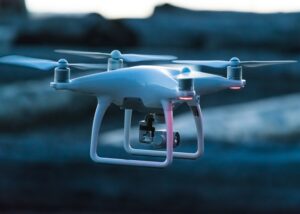Looking back into the distant past as well as the foreseeable future (and beyond), one thing remains common: the desire to keep our homes safe and sound. Imagining the future can help us better prepare for what’s to come, including the future of home alarms.

A Look Back to Look Ahead
Home security has a fascinating history, which has undergone numerous changes over the generations.
Ancient civilizations relied on physical barriers like walls, gates, and even motes to keep out unwanted intruders. If you were wealthy enough, you may have also hired guards, watchmen, or soldiers to ensure the wrong people weren’t encroaching on your land.
In the Middle Ages, castles with high walls, moats with drawbridges, and guarded gates became common among noble families. Of course, that was a slim minority of the population. Ordinary people had simpler means of production, such as barred doors and perhaps secret places to hide if needed.
By the 18th and 19th centuries, more sophisticated building and security techniques were introduced. For instance, there were better locks and more secure windows. The wealthy also employed others to help protect their homes and lands.
In the early 20th century, the invention of the telephone led to leaps in the future of home security. Home security systems quickly started using telephone lines to connect to central monitoring stations. By the mid-20th century, more sophisticated home security systems that incorporated motion sensors, cameras, and electronic alarms became common.
As of the early 21st century, the digital revolution transformed home security. From wireless technology to digital security cameras to smart home integration made remote monitoring and control of a home security system not only possible but easy to use. This led to an era of DIY home security systems that are readily available to average homeowners and renters.
Home Security Today
Today, home security is increasingly integrated with smart technology, including the Internet of Things, which provides personalization and efficient security solutions. Several significant advances over just the last couple of years have transformed the home security landscape, embracing greater connectivity and convenience.
Some noteworthy advancements include:
- Smart Home Integration for seamless control and monitoring of cameras, alarms, locks, and other security features. Individuals can use smartphones and voice-activated devices to help ensure their homes stay more secure.
- Artificial Intelligence (AI) and Machine Learning are helping detect unusual activity and sending alerts. In addition, biometrics are helping enhance home security.
- Interconnectivity with wireless devices enhances communication of sensors, cameras, locks, and more for greater convenience and flexibility when installing and operating home security systems. It also allows homeowners to control and monitor their systems with a convenient app that provides real-time alerts, video feeds, system arming and disarming, history logs, and more.
- Higher Quality Cameras with high-definition, night vision, motion tracking, zoom capabilities, two-way audio, and more allow homeowners (and law enforcement if needed) to better monitor the property and communicate to ensure people at the home are guests rather than intruders.
- Power Backups like batteries and solar cells enhance energy efficiency and protection if utility services go down.
- Advanced Encryption and Cybersecurity are necessary advancements to protect systems against hacking or unauthorized access to sensitive data.

The Future of Home Security
The future of home security will build on these advanced technologies. We may, for example, be seeing more integration of biometric locks, such as fingerprints or facial or voice recognition, and predictive AI, which could help anticipate and then prevent security breaches before they happen.
We can also expect greater integration with smart home ecosystems for a seamless automated experience. Alarms will be able to interact with other smart devices, such as lights, locks, thermostats, and sensors, for greater security and efficiency.
AI is also expected to play a prominent role in the future of home security. Systems will likely use this technology for more accurate threat detection, which could help reduce false alarms as well as promote faster response times from law enforcement. Settings could also automatically adjust to better support the user as well as any local threats detected. This could allow systems to better predict and thus prevent potential security issues.
Advancing wireless technology (such as the expansion of 5G) could also make systems both faster and more reliable. In addition, they will likely make it easier to install or adjust alarm systems.
We may even see increased use of drones and robotics, which help keep an eye out over larger distances. For instance, drones could be used to patrol a perimeter and provide real-time video feeds.
Other growing needs for home security will include enhanced cybersecurity measures to protect your data and privacy. Energy efficiency is also important to align with a growing emphasis on sustainability and cost savings.
The Future of Home Security Takeaway
The future of home alarms will likely be characterized by more integrated, user-centric systems. Not only will these futuristic systems prevent intrusions, but they’ll also provide comprehensive, automated, and intuitive security, leading to greater peace of mind.
ADT (now Telus) has been helping protect and connect customers since 1874. We’ve used technology to innovate and widely expand home security to monitor for burglary, fire, flood, and more.
Check out our packages and call now for a free quote at 1-855-518-4458 and talk with an expert about a customized package to keep your home safe and secure. Remember, a security system could help you save on homeowner’s insurance and offer additional safety and protection as well as greater peace of mind.
